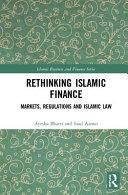Its Development and Future
To truly understand the current interest in the development of Islamic banking and finance in South-East Asia and how it is different from the conventional banking system, one must first understand the religious relationship originating from the Qur''an, and then trace the historical geographic and political developments of Islam over recent centuries. Only on this basis can the reader, without prejudice or cynicism, begin to appreciate Shari''ah law and Islamic jurisprudence. With this platform established in the first part of the book, readers are invited to learn about the financial products and services offered, understand the challenges in their development, and ultimately recognize the significant opportunities that Islamic banking and finance can provide both Muslims and non-Muslims. This second edition contains updates of statistics and dates with regards to the development of Islamic banking in Malaysia, Singapore, Indonesia and Brunei. In particular, the chapter on Singapore details significant developments such as the direction which major banks are taking towards Islamic banking and the increase in Islamic banking products being offered. Although written by a non-Muslim author, this highly-regarded book is being translated into Arabic by a leading Islamic university in the Middle East. Sample Chapter(s). Chapter 1: Islamic History (699 KB). Contents: Islamic History; Shari''ah Law and Islamic Jurisprudence; Islamic Commerical Law; Islamic Financial Products; Issues and Challenges of Islamic Banking Today; Islam in South-East Asia; Colonial Legacies: Islam and State Law in South-East Asia; Islamic Banking in Malaysia; Islamic Banking in Indonesia; Labuan: A Niche in the Islamic Money Market; Islamic Banking in Brunei; Banking in Singapore. Readership: Investors; bankers; financial industry players; upper-level undergraduates and post graduate students in Islamic studies, banking and finance.
This second edition contains updates of statistics and dates with regards to the development of Islamic banking in Malaysia, Singapore, Indonesia and Brunei.








